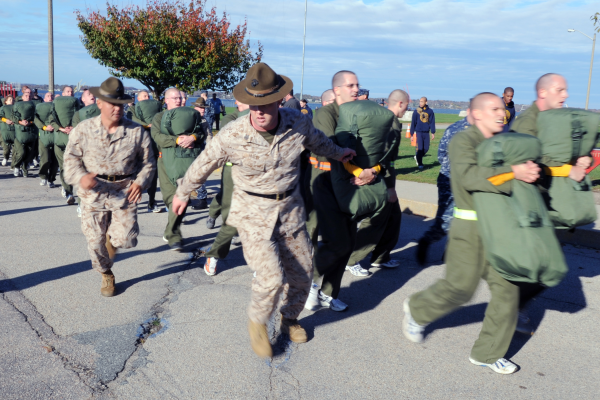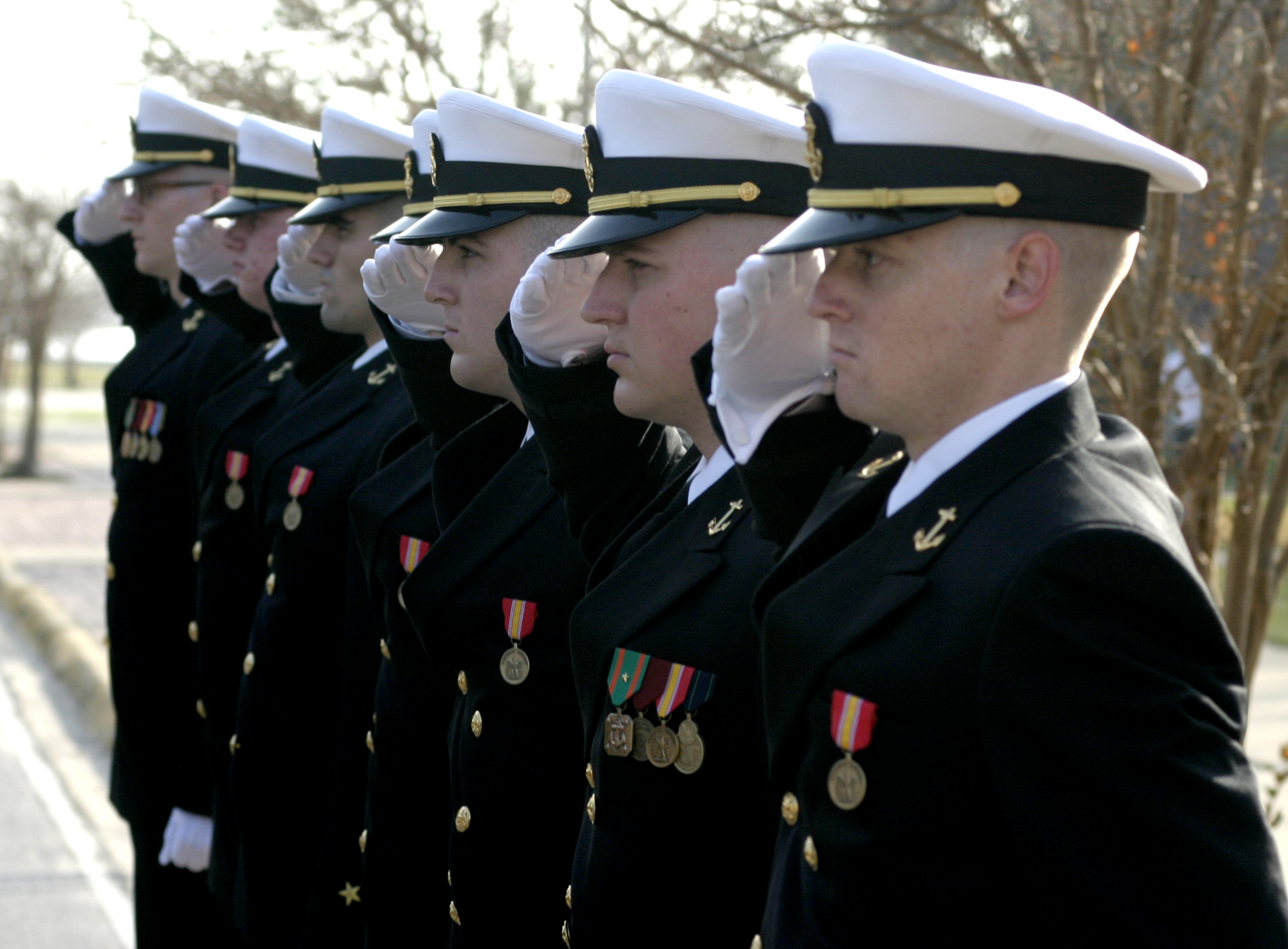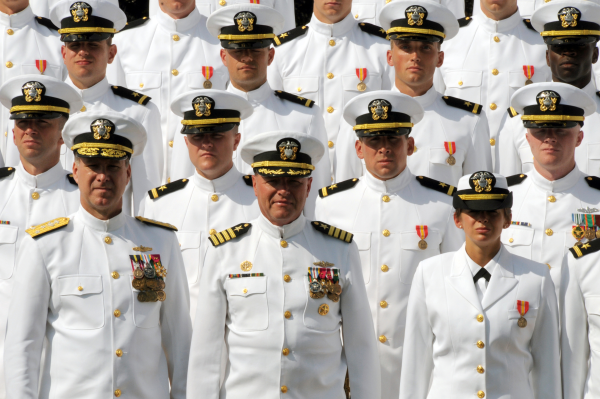If you are a college graduate or currently a student and you want to serve your country as a Navy Officer, you must attend Navy Officer Candidate School.
Navy officers are well-respected and educated leaders who manage the weapon systems, personnel, and ships in the Navy.
The path to becoming a Navy Officer includes attending Navy Officer Candidate School.
Continue reading for your guide to the Navy OCS.
Need Help Acing The OCS Test?
 Looking to improve your Officer Candidate School (OCS) Test scores?
Looking to improve your Officer Candidate School (OCS) Test scores?
If so, you need to check out the Mometrix ‘Officer Candidate Tests Secrets Study Guide‘.
It’s packed with info on exclusive test taking techniques like:
- Keys to questions that give away the wrong (or right) answers
- Super Speed methods to get through the questions you know with ease
- How to manage your time on the test efficiently
- and much more
Click Here to visit the official Mometrix site to learn more.
Jump To A Section
1. What is the Navy Officer Candidate School (OCS)?
2. Navy OCS Basic Requirements
3. How long is Navy OCS?
4. How Are Future Officers Evaluated?
5. Navy Officer Responsibilities
6. How Do You Get to Navy OCS?
7. What is taught at Navy OCS?
8. How hard is Navy OCS?
9. Other Frequently Asked Questions (FAQ)
Summary
1. What is the Navy Officer Candidate School (OCS)?

The Navy Officer Candidate School prepares candidates for being an officer.
Recruits must understand military law and culture, and they must possess the skills necessary to manage others successfully.
Also, during this training, candidates learn skills that are applicable over a range of responsibilities an officer might encounter as an officer in the Navy.
2. Navy OCS Basic Requirements
To join the Navy, all members must meet some basic expectations:
For instance, members must be between the age of 17 to 39.
Also, to enlist, you must be a U.S citizen or have a permanent resident visa or green card with a residence and a home of record in the United States.
You may be a single parent, but you cannot have more than two dependents who are minors.
A high school degree or GED is necessary.
Also, service members must be drug and alcohol-free.
Service members should demonstrate good character and citizenship.
Lastly, the service commitment is the amount of time you commit to active duty status, and officers tend to require commitments of three to five years, and sometimes longer.
Related Article – How To Get Into The US Naval Academy: 5 Challenging Steps
3. How long is Navy OCS?
The Navy Officer Candidate School course is twelve weeks long. The training involves the goal of giving candidates the knowledge necessary to take on the expectations of a Naval officer.
4. How Are Future Officers Evaluated?
Future officers are evaluated and recommended by their commander or through ROTC for Officer Candidate School.
Established Naval officers receive a Fitness Report (FITREP) for evaluation.
This Fitness Report evaluates officers against a set of expectations and standards for the officer’s responsibilities.
Therefore, the main objective of the FITREP is not just to find areas of refinement, but it is to give feedback to the officer and help with improvement.
Lastly, the FITREP also determines the potential for promotion.
5. Navy Officer Responsibilities

Naval commissioned officers are divided into four different types with different responsibilities.
Overall, the responsibilities are similar.
A Naval officer has the seniority and authority to expect others to follow orders.
Also, the officer has the authority to fulfill the responsibilities of their assignment within the Navy.
The details of what these responsibilities depend on the restrictions the different officers have.
Restricted Line Officers
Restricted Line Officers face restrictions in their duties.
Engineering, aerospace engineering, aviation, or another special duty are typical designations.
Often there is some sort of medical restriction disqualifying candidates for unrestricted.
However, officer candidates do apply for restricted status.
Unrestricted Line Officers
An Unrestricted Line Officer can command ships, aircraft squadrons, submarines, fleets, shore bases, and naval bases.
These officers are not restricted in the performance of duty, and these officers advance to be Admirals and command battle groups and Naval ships.
Staff Corps
Candidates who are Staff Corps are specialists in fields of which they are already professionals.
For instance, fields such as doctors, nurses, and layers, to name a few.
These officers receive their commission through a five-week Officer Candidate School or ROTC or by Direct Commission.
Limited Duty Officers
A Limited Duty Officer is typically a former enlisted member of the Navy who have enough training and experience in their field.
Also, a degree is not necessary to be a Limited Duty Officer, but there are limitations to the duty area of which they are experienced.
6. How Do You Get to Navy OCS?
There are three different avenues of approach for the Navy Officer Candidate School.
Some recruits apply after graduating from a college or university after obtaining a traditional 4-year bachelor’s degree.
Other recruits are enlisted members of the service who have earned the opportunity to become an officer.
Furthermore, some recruits are Direct Commission Officers (DCO) who already have a specialized degree or set of skills.
7. What is taught at Navy OCS?
The goal of Navy Officer Candidate School is to prepare candidates with a basic level of understanding that is necessary for all officers in the Navy.
Academics
Candidates will cover several academic areas including:
Officer fundamentals that prepare candidates for the duties expected of a division officer.
Also, candidates learn Naval history and advancements in navel technology since 1775.
Damage control to enable candidates to handle fires and flooding on a ship.
Leadership and ethics training prepare candidates by instilling leadership principles and practices.
Lastly, candidates receive training in watch officer duties, including terminology, equipment, operations, and navigation.
Military Training
The goal of Navy Officer Candidate School is that candidates leave behind the idea of the individual and transition to an identity that is part of a team.
The candidate’s goal revolves around being professional and competent worthy or trust. Because of this goal, candidates participate in military training.
Physical training is essential, and candidates receive training in proper form and learn new exercises.
Maintaining a living space that meets the Navy’s standards is essential. Therefore, candidates learn the expectations of being tidy.
However, living spaces are not the only inspections candidates face; hygiene and uniform standards are essential, as well.
Candidates learn rifle drills, as well.
Battle station tests is a battle of strength of the individual and the team, and candidates learn the skills necessary to complete these skills as a team.
Also, commissioning ceremonies involve many customs and traditions.
Therefore, candidates learn the details of this ceremony.
Related Article – Navy Grooming Standards: Hair, Mustache, and Nail Regulations
Navy Officer Candidate School Phases
There are three phases in the twelve-week course.
Phase 1
The focus of the first phase, which is the first three weeks, is the introduction of candidates to the profession by focusing on discipline, detail, and the creation of a unit.
During this time, candidates receive uniforms and learn an overview of the course expectations.
Also, during this phase, there is an emphasis on drills and physical conditioning.
Phase 2
Afterward, the next five weeks are considered phase two.
During this phase, academics is the focus so candidates can meet the expectations of the core competencies necessary to graduate.
At the end of this phase, officers receive their assignments, which is based on class standing.

Phase 3
The final phase is four weeks in length.
In this phase, candidates are not Candidate Officers.
At this point, Candidate Officers apply what they learned about leadership.
8. How hard is Navy OCS?
The naval Officer Candidate School is demanding and challenging.
This challenge helps candidates develop their potential and qualities that best represent the Navy.
The difficulty helps candidates learn to perform with discipline in adverse situations while under pressure.
9. Other Frequently Asked Questions (FAQ)
Compared to other branches, is Navy OCS hard to get in to?
The Navy Officer Candidate School is very competitive.
When applying, the best course of action is to prepare to ensure your application stands out.
A candidate should score high on the Officer Aptitude Rating (OAR) section on the Aviation Standard Test Battery (ASTB).
Also, the overall score should be high on the ASTB.
Plan to include any letters of recommendation to the application, as well as any awards.
Furthermore, ensure your Grade Point Average (GPA) is high.
Lastly, it will help if you are in peak physical condition.
What is the difference between OCS and ODS?
By contrast, the Navy’s Officer Development School is for newly commissioned officers.
As mentioned before, the Staff Corps are already professionals in their field.
Also, restricted Line Officers may receive their training through ODS.
The Officer Development School serves to introduce these officers to the history, traditions, and customs of the Navy.
Therefore, this school is demanding both mentally and physically.
Usually, officers pursuing careers in specific fields go through this school, including:
- Healthcare
- Oceanography
- Some engineering programs
- Chaplain services
How often does Navy OCS start?
Each fiscal year there are approximately 20 different class start times for the Navy Officer Candidate School.
What rank are you after Navy OCS?
While in training at the Navy Officer Candidate School, candidates are at the pay grade of E-5.
However, those enlisted service members with a higher pay grade will maintain their current grade.
Do they do drug tests in OCS?
The Navy has a zero-tolerance for drugs and alcohol.
Therefore, there are random drug tests.
Anyone who tested positive for illegal drugs faces separation from the Navy, as well.
Also, those who have a positive alcohol test are screened for dependency issues and might face separation, as well.
Where will I be stationed/based after OCS?
There is no one path for those who complete the Navy Officer Candidate School.
However, those who finish OSC often go on to more schooling and where that depends on the warfare community to which you are attached.
For instance, aviators will continue to flight training.
Nearly all warfare community has some sort of course to complete, but you will continue to learn more as you transition to your job.
Afterward, where you end up stationed after all the subsequent training depends on the needs of the Navy.
Related Article: Navy Enlisted And Officer Ranks And Pay
Conclusion
The Navy Officer Candidate School is a demanding 13-week course.
After fulfilling all requirements for the Navy and as an officer, you can apply for Officer Candidate School.
The Navy OSC is very competitive, and many applicants plan ahead to ensure their application stands out from the rest.
After completing OSC, officers continue their education in their field.
Afterward, officers move into their new positions as respected and confident Navy officers.
References:
https://www.public.navy.mil/netc/nstc/otcn/index.aspx
https://www.public.navy.mil/netc/NSTC/otcn/ocs.aspx
- Ikon Pass Military Discount: Learn How To Save Big - January 31, 2025
- RTIC Military Discount: Find Out How To Save Big on Gear - January 30, 2025
- Traeger Military Discount: Learn How To Save Big on Smokers - January 28, 2025
General FAQ
Is Navy OCS hard?
Attending OCS in the Navy is certainly challenging. With that said, it's a very rewarding path that has a lot of benefits on the back end of your service.
How competitive is Navy OCS?
Becoming an officer in the Navy means that you need a good GPA, solid A's and B's in science and math courses, and be an over well adjusted / well rounded individual.
How long is OCS in the Navy?
The Navy OCS course is a 13 week program that challenges not only your physical toughness, but also mental toughness.
Where will I be stationed after OCS?
Where you will be based is based on a number of factors. If you joined to become a pilot, you will likely be stationed in Pensacola, FL. If you joined to become a SEAL, you will be stationed in Coronado, CA.

